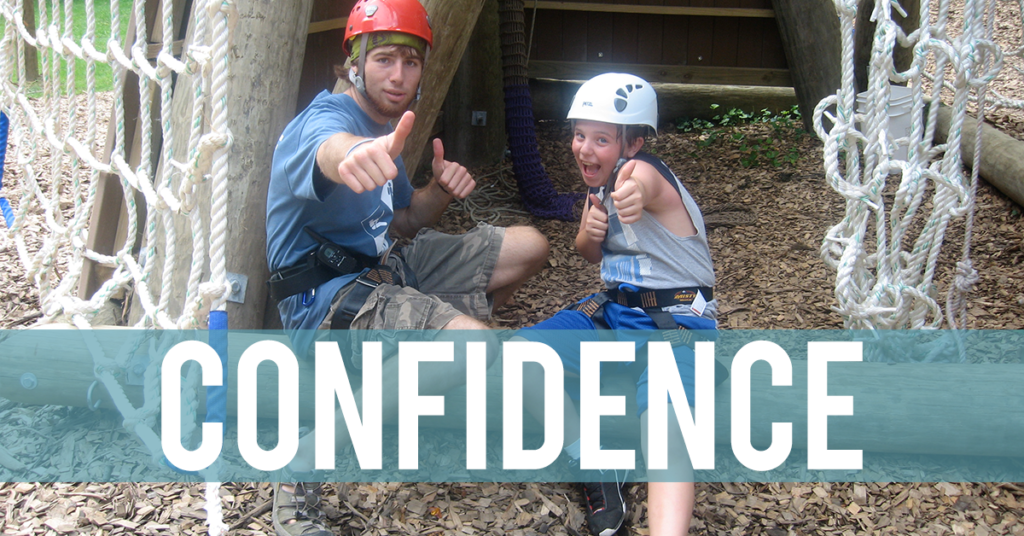Confidence is important in all stages of development, from childhood all the way through adulthood. The way in which we carry ourselves conveys a lot to potential friends, teachers, classmates, love interests, colleagues, and employers. Confidence is key. So, how do we, as parents, ensure our children grow up to be confident adults? Well, it could all start with how your child plays.
Adventure Play is Important to Confidence Development
“It is well known that children learn through play,” says Dr. Bill Sears, who has been advising busy parents on how to raise healthier families for over 40 years. “Instead of viewing playtime as a chore, use it to make an investment in your child’s behavior.” Children learn through exploration and interaction. According to ZERO to THREE, an organization whose mission is to ensure that all babies and toddlers have a strong start in life, states that “Play is how children learn about themselves, other people, and world around them. Through play, children also learn how to solve problems and develop confidence.”
“It’s particularly important for young children to have the chance to play and take risks,” says Kathy Hirsh-Pasek, PhD, professor of psychology at Temple University.
At Terrapin Adventures, we work with children to get them outside their comfort zone. As they tackle their fears head on, they build confidence.
Let The Child Make Decisions
“Let your child lead playtime—this will build his confidence, assertiveness, and leadership skills,” advises ZERO to THREE. “More learning takes place when the child chooses what to do,” adds Dr. Sears, and “also increases self-worth.”
“When your child gets the chance to make choices from a young age, he’ll gain confidence in his own good judgment,” says Alina Tugend from Parents Magazine. Of course, there is a delicate balance that must be struck between making decisions and wanting total control. Remember, you are still the parent.
At Terrapin Adventures, youth groups make decisions as they solve problems and develop social skills working together.
Let Your Child Fail
“To build confidence in the world, kids have to take chances, make choices and take responsibility for them,” says Victoria Sopik, CEO of Kids & Company, a corporate childcare service in Toronto.
We all learn through failure. Charles Kettering once said, “Failing is one of the greatest arts in the world. One fails toward success.” This is just as true for children as it is for adults. Sometimes in life, the greatest lessons we learn come after failure. John Dewey perhaps said it best: “Failure is instructive. The person who really thinks learns quite as much from his failures as from his successes.”
“Kids need to know that it’s okay to fail, and that it’s normal to feel sad, anxious, or angry,” says Robert Brooks, PhD, coauthor of Raising Resilient Children. “They learn to succeed by overcoming obstacles, not by having you remove them.”
At Terrapin Adventures, we encourage trying new things, being open to new ideas, and to take risks in a supportive environment.
Parent Involvement Also Plays a Role
Children, especially young children, require supervision and, more importantly, companionship. A child isn’t a rotisserie cooker. You can’t just “Set it and forget it!” Playing with your child gives them the message that “You are worth my time. You are a valuable person,” says Dr. Sears. It can also be incredibly beneficial and therapeutic for parents as well. “Playtime puts us on our child’s level, helping parents get behind the eyes and into the mind of their child,” adds Dr. Sears. “The child reveals himself to the parent—and vice versa— during play; the whole relationship benefits greatly.”
“Parents who exercise with their children are not only teaching them how to live a healthy lifestyle, they are also reinforcing the family bonds and creating wonderful family traditions,” says Pam Howard, certified health coach and mother of two. Plus, physical activity is scientifically proven to increase happiness.
“Psychological well-being was independently associated with attaining and maintaining higher physical activity levels over 11 years,” write study authors Eric S. Kim, Laura D. Kubzansky, Jackie Soo, and Julia K. Boehm.
Invest in Playtime
“Consider playtime one of your best investments to raise a confident child,” says Dr. Sears.
Conveniently located in Howard County, Maryland, between Baltimore and Washington DC, Terrapin Adventures has a ropes course specifically designed for children ages 5-10 – our Terrapin Explorer kids’ course. With 22 different fun elements, the Terrapin Explorer lets kids walk, balance, swing, zip, and crawl as they get the physical activity they need. Don’t worry! There’s plenty for parents to do as well!
Check out our Adventure packages for which package is right for your young adventurer.
Book Your Adventure
“Try to expose your child to a wide variety of activities, and encourage him when he finds something he really loves,” says Tugend.
If you have any questions, please call Terrapin Adventure at 301.725.1313, or email us at info@terrapinadventures.com to learn more.
Works Cited
- “12 Ways to Raise a Confident Child.” Ask Dr Sears, 1 Oct. 2015, www.askdrsears.com/topics/parenting/child-rearing-and-development/12-ways-help-your-child-build-self-confidence.
- Tugend, Alina. “9 Secrets of Confident Kids.” Parents, Parents, 22 May 2017, www.parents.com/toddlers-preschoolers/development/fear/secrets-of-confident-kids/.
- “Tips on Helping Your Child Develop Confidence.” ZERO TO THREE, www.zerotothree.org/resources/226-tips-on-helping-your-child-develop-confidence.

